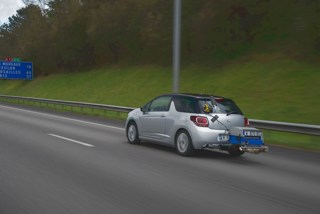Real-world fuel consumption tests of Peugeot, Citroën and DS vehicles have proved to provide accurate information that matches data provided by drivers of their own mpg rates.
After 18 months of testing 60 vehicles with over 430 road tests covering more than 25,000 miles, PSA – with three partner organisations – have published a report on their real-world fuel economy findings.
Roughly 1,000 results not only match internal PSA data from its customers - but also the information uploaded by drivers themselves online.
PSA said the purpose was to give full and transparent information to customers regarding the real-world fuel consumption of the group’s models.
It worked with Transport & Environment (T&E), France Nature Environnement and Bureau Veritas on the protocol.
Gilles Le Borgne, PSA Group executive vice president, quality and engineering, said: "The protocol is a reliable response to the questions our customers may have concerning their consumption.
“They can access comprehensive and transparent fuel consumption data audited by Bureau Veritas.”
Greg Archer, director of clean vehicles at T&E, said: “These real-driving tests show that it is perfectly possible to achieve CO2 emissions and fuel consumption figures almost identical to those obtained by drivers on the road.
“But real-driving tests are only part of the solution to the emission cheating scandal.
“The upcoming EU decisions on how and who approves cars for sale will be key to ensuring the system of testing and approving cars is independent and rigorously enforced."
The measurements obtained on the 60 models make it possible to estimate the consumption in real-world driving conditions of more than 1,000 versions of Peugeot, Citroën and DS vehicles.
For each model, the estimates have been made using the same engine and gearbox, plus three variants: body type, trim level and tire size.
Fleet managers running Peugeot, Citroën and DS cars and LCVs can check their average consumption in real-world driving conditions by logging onto their respective websites (addresses below).
A web-based application allows them to view this data for their model by entering body type, trim level, engine, gearbox and type of tyres.
They can also estimate their own consumption based on the actual use of their vehicle (number of passengers, load, driving style, etc.).
The development of the real-world fuel consumption test protocol started in late 2015 to cover 80% of the volumes sold by Peugeot, Citroën and DS brands, both for passenger cars and light commercial vehicles.
The tests performed on passenger cars revealed an average fuel consumption of 5.8 litres/100km (1.3 gallons/62 miles), and confirm an average gap with official type approval figures of 1.74 litres/100 km (0.4 gallons/62 miles).
The results are accurate within 0.3 l/100km (0.07 gallons/62 miles).
The measurements carried out under the protocol showed:
- the tests show that on-board computer gives reliable information to the driver
- a diesel car consumes 1.5 l/100km (0.3 gallons/62 miles) less than a petrol one
- in urban conditions, the gap between certification and real-life data is equal for diesel at 2.4l/100km (0.5 gallons/62 miles) and petrol at 2.5 l/100km (0.6 gallons/62 miles) when expressed in litres/100km but is higher for diesel (53%) compared to gasoline (42%) when expressed in percentage
- a diesel car’s efficiency is less sensitive to driving style than that of a petrol car.
- Fuel consumption is lower on cars with a manual gearbox than with an automatic transmission.
First figures for NOx emissions will be available by the end of 2017.
PSA Group brands’ UK fuel consumption calculators



















Login to comment
Comments
No comments have been made yet.